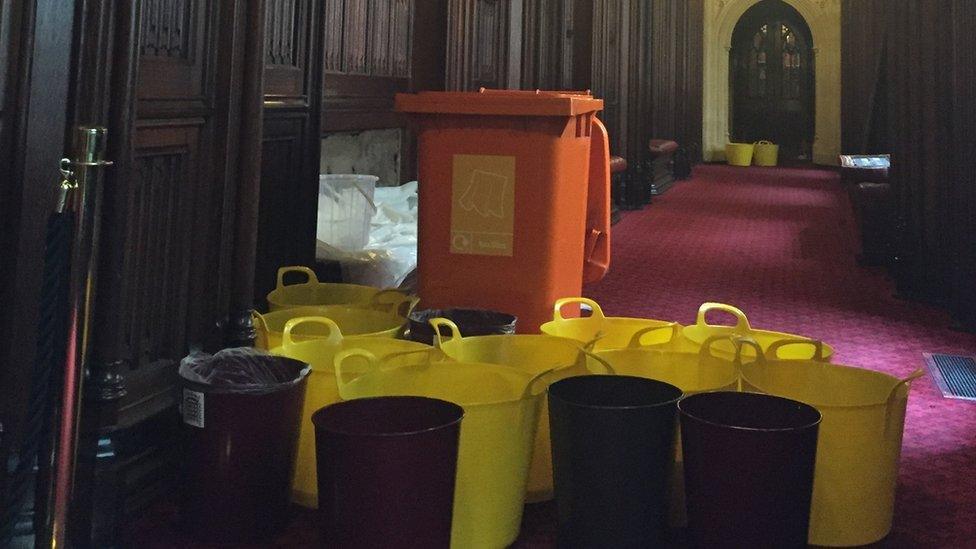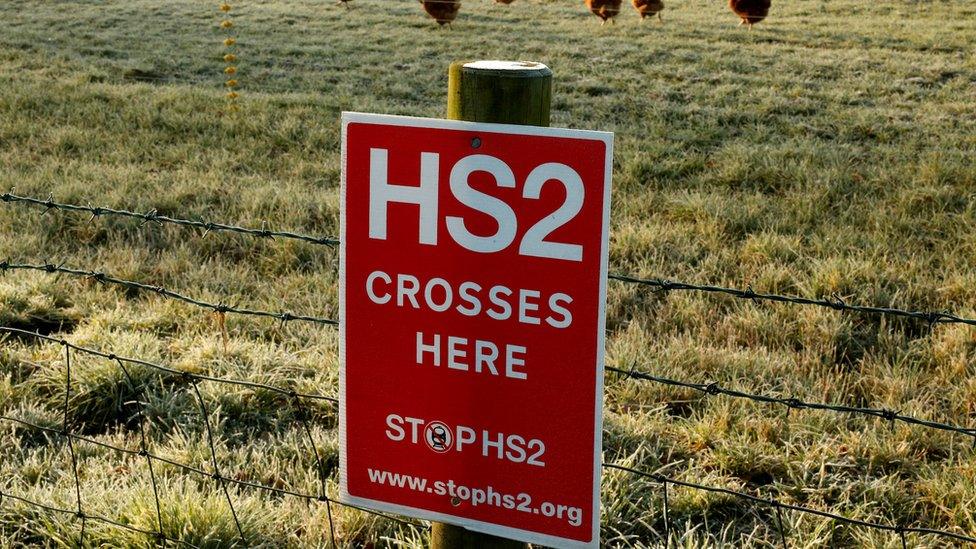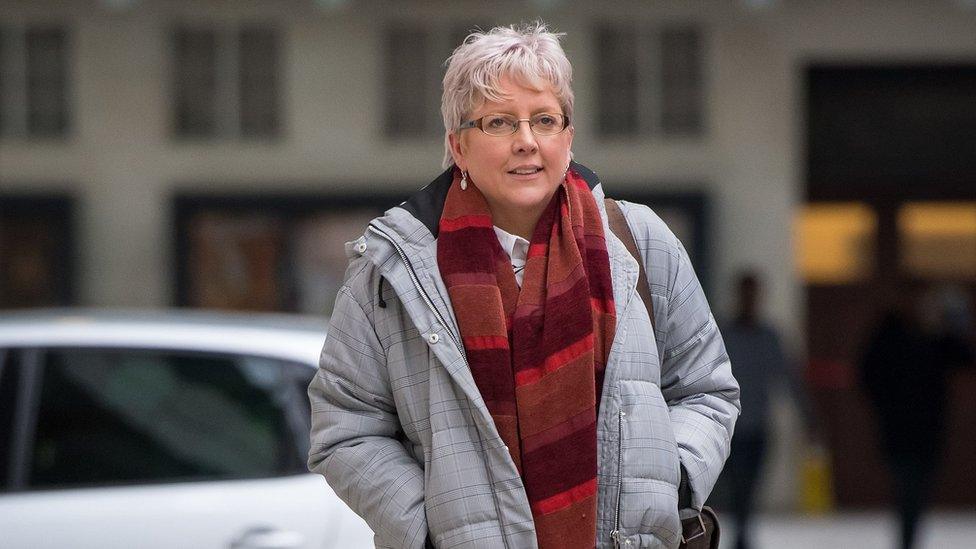Week ahead in Parliament
- Published

Leaks are a common occurrence in the Palace of Westminster
MPs will take a breather from Brexit this week, turning their attention to matters such as the next stage of HS2, and the renovation of their Victorian home.
Meanwhile peers will dive head-first into the deep waters of the EU (Withdrawal) Bill. That will mean some intensive politics in both chambers.
Some serious backbench players in the Commons insist MPs should take a firm decision on moving out of their iconic home, to allow for vital repair work, (see Wednesday) and I suspect the debate between those who want to remain in Parliament and those who want to leave may see Brexit-style vehemence and mutual incomprehension.
The Lords debate on the EU bill will be a (very) lengthy overture to a long process which will probably culminate in amendments being voted through after Easter, followed by a game of legislative chicken with the Commons when it is bounced back to MPs.
Watch out for the internal party games, and, I suspect, increasingly obvious cracks, as the main party leaderships try to rein in their pro-EU campaigners.
Here's my rundown of the week ahead:
Monday 29th January
The Commons begins (2.30 pm) with Education Questions, which will see the debut of newly-promoted Education Secretary Damian Hinds. Expect the usual post-weekend urgent questions and statements from ministers at 3.30pm.
Otherwise, it looks quite a light day, with MPs invited to polish off the remaining stages of two fairly uncontroversial bills, the Armed Forces (Flexible Working) Bill and the Automated and Electric Vehicles Bill.
The adjournment debate, though, could be pretty lively. Labour MP Chris Bryant will be raising the situation in Bermuda, where a court ruling established the right to same-sex marriage for British citizens; since then both houses of the Bermuda Parliament have voted to abolish same-sex marriage and replace it with civil partnerships.
But this can only become law if the governor of Bermuda signs it....and since the UK government appoints the governor, Mr Bryant will be questioning a foreign office minister. Will it be Alan Duncan, himself in a same-sex marriage?
At 4.30pm in Westminster Hall, MPs will debate an online petition, external which calls for more restrictive laws on fireworks, including "a ban on public use".
My committee pick is the public accounts hearing on academy schools (4pm) with Department for Education officials - the costs and benefits of academies are always a sensitive issue.
In the Lords, questions to ministers (2.30 pm) cover the establishment of an independent inquiry into the Crown Prosecution Service and its relationship with police authorities, and the full integration of Gibraltar in the Brexit negotiations.
That is followed by a debate on the government's new 25-year environment plan, external, and a short debate on relations with Russia.
Tuesday 30th January
The Commons opens (11.30 am) with Business, Energy and Industrial Strategy Questions.
The day's ten-minute rule bill, proposed by the Conservative Zac Goldsmith, would give Kew Gardens the right to lease out its buildings for more than 31 years. He says the gardens are a major national asset and the move would allow them to raise more money to fund growth and development.
Then it's déjà vu as MPs debate the second reading of the High Speed Rail (West Midlands-Crewe) Bill - the latest legislative phase of the controversial scheme, which looks set fit to reprise the same arguments that dogged the bill authorising the first stretch of the line.

A caucus of Conservatives along the proposed route of the extended line - Michael Fabricant, Bill Cash and Jeremy Lefroy - have put down a motion to block the bill. Mr Fabricant's amendment makes the case that the scheme as designed fails to connect to HS1, the line to the Channel Tunnel, and has serious environmental disadvantages, as well as being far more expensive than alternative schemes. The first phase of HS2 had cross-party backing, but 42 Conservatives voted against it; if Mr Fabricant's amendment is selected and pushed to a division, he expects a not-dissimilar showing - although he does not expect to see the bill defeated.
My committee pick is the joint BEIS-Work and Pensions hearing on the collapse of Carillion, which will explore the issues of corporate governance and pension funding. This echoes the two committees' previous collaboration on the collapse of BHS, which proved highly effective. Witnesses include various regulators and trustees of the Carillion pension fund.
In Westminster Hall, the Conservative Derek Thomas leads a debate on marriage in government policy (9.30-11am). He has regularly pushed ministers to back measures strengthening marriage. Robert Halfon has a debate (11-11.30am) on hospital car parking charges in England - an issue which he will also be raising in the chamber in a backbench debate on Thursday.
In the afternoon (2.30-4pm), Labour MP Kevin Brennan raises the treatment of adults with autism by the criminal justice system. He says people with autism can come into contact with the criminal justice system when behaviour related to their condition is misunderstood, and argues that better training and awareness is needed.
And Conservative former minister George Freeman has a debate on town and village plans (4.30-5.30 pm). He will call for a move away from a "broken" developer-led planning system, and a move to a 'plan-led', process, where communities put together a vision for their town and then approach developers to build it, rather than the other way round.
In the Lords (as predicted here, last week) it's an early 11am start to accommodate the burgeoning speakers list for the second reading of the European Union (Withdrawal) Bill...where, apart from front benchers, peers will chafe under a 6-minute time limit on their speeches.
And there's an early salvo from the High Priest of the Remain cause, the former Labour Cabinet Minister, Lord Adonis, who will move a regret motion "that the Bill makes no provision for the opinion of the people to be secured on the proposed terms on which Her Majesty's Government proposes that the United Kingdom withdraw from the European Union."
This looks very like an appetiser to an amendment later on, but it is also aimed at the internal politics of the Labour group in the Lords - as I wrote earlier, no amendment will get passed without official Labour whipping to rally the largest Opposition group behind it, so the Labour leadership would need to change its stance pretty radically for a second referendum amendment to be attached to the Bill. One tactical question for Lord Adonis will be whether he wants to push his motion to a vote, which could expose serious divisions on the Labour benches. At the moment, I'm told, he is undecided.
This could also be an early test of Labour's new chief whip in the Lords, the legendary, and now ennobled Commons whip Tommy McAvoy. Although a Brexiteer by personal conviction, he is above all, tribally Labour - and few doubt that one of his key objectives will be to maximise the pain the government will have to endure.
Wednesday 31st January
MPs begin their day with Wales questions (11.30 am) before Prime Minister's Questions at noon.
The day's ten-minute rule bill, from the Labour MP Louise Haigh, is about extending freedom of information legislation to cover private contractors. It is topical because of Carillion but also because of constituency issues - like the row in Sheffield about the private contractor Amey and their role in cutting down trees.
After that, there will be an opposition debate on a subject to be announced - and then a debate on a series of motions on the restoration and renewal of the Palace of Westminster.
This is parliamentary code for the proposal to move MPs and peers out of their historic Victorian home to make way for a multi-billion pound repair programme. The government has put down two alternative motions, the first of which would effectively continue with a 'make do and mend' approach, and put off any more comprehensive repair programme, while the second would accept that a major restoration programme is needed, but then postpone a firm decision while commissioning further studies.
And that has prompted a further amendment by a posse of heavyweight backbenchers, led by Labour MP Chris Bryant, who served on the special committee which recommended moving Parliament out of the Victorian Palace of Westminster for several years. Backed by PAC Chair Meg Hillier, Administration Committee Chair Sir Paul Beresford and other serious Commons players, he is proposing a hard exit, with the parliamentarians decamping for several years, to allow the work to be completed as rapidly as possible.
It is said to be a completely free vote - so which way will MPs jump? Well the debate will follow a Labour opposition day motion, so pretty much all Labour MPs will be present, and the 'get on with it' crowd claim the support of "at least" four cabinet ministers. Against that there are plenty of backbench sceptics who think the cost of the project is wildly overblown and who point to the near doubling in costs for restoration work on the Elizabeth Tower, (the one which contains Big Ben).
The SNP, meanwhile, in their continuing quest to highlight what they see as the archaic ways of Westminster, have amendments to move the Commons towards electronic voting, so that MPs do not spend 15 minutes or more trooping through the division lobbies every time there is a vote, and to consider moving Parliament out of Westminster altogether.
The adjournment debate, led by Labour MP John Woodcock, will be on the important issue of British jihadis returning from Iraq and Syria.
In Westminster Hall, Labour MP Laura Pidcock leads a debate (9.30-11am) on Personal Independence Payments, the benefit which replaced Disability Living Allowance for new claims from 8 April 2013.
She says they provide the most casework in her North West Durham constituency, where the issues include the long, drawn-out process of claiming the benefit, including filling in paperwork, attending assessments, challenging decisions and making appeals.
"I have found that people with mental health problems often find the process the most challenging due to the way the assessment is focused on physical conditions," she said.
"This has led to constituents contacting me who are in severe distress and some suicidal."
My committee picks are the debut (9.45 am) of Karen Bradley, the new Northern Ireland Secretary before the Northern Ireland Committee, and the appearance of the director general of the BBC Tony Hall, before the Digital, Culture, Media and Sport committee to talk about gender equality in BBC pay (2pm). Also before the committee is the BBC's China Editor Carrie Gracie, who resigned over the issue.

Carrie Gracie has accused the BBC of having an "illegal pay culture"
In the Lords, it's day two of the second reading debate on the European Union (Withdrawal) Bill, with an unusually early start at 10 am. Again, question time will be at its usual time, so they will interrupt the debate at 3pm, for half an hour of questions to ministers. It will be interesting to see if Lord Adonis forces a vote on his amendment.
Thursday 1st February
MPs open (9.30am) with questions to the Brexit Secretary, David Davis, followed by the weekly session of Commons Business Questions to the Leader of the House, Andrea Leadsom.
The first of the day's main debates is the subject of baby leave for MPs. Labour MP Harriet Harman, who was expecting when she entered the Commons in 1982, wants to devise arrangements for women MPs who are having babies, and for male MPs whose partners are having babies. She argues that those MPs "should be entitled but not required to discharge their responsibilities to vote in this House by proxy." The idea would be to authorise the Speaker to work out the details - perhaps via the procedure committee.
Next, there is a debate on hospital car parking charges - the subject of a long running campaign by Conservative ex-minister Robert Halfon, who believes the government 's 2014 guidelines to curtail the cost of car parking charges are not working. He says 47% of hospitals have increased their hourly charges since then and that close to 50% of hospitals charge disabled people to park.
In Westminster Hall there's a debate (1.30pm) on a report from the Environmental Audit Committee about the regulation of chemicals after Brexit.
Committee Chair Mary Creagh will be talking about the extra evidence that the chemicals industry has submitted - which includes warnings about the impact of leaving the EU, and will seek to clarify the government's plan for chemicals regulation and registration once the UK leaves the EU single market, and therefore loses full access to the REACH database.
My committee pick is the Northern Ireland Committee's hearing in Stormont, on "Devolution and Democracy in Northern Ireland." This will look at the prospects for restoring the Executive.
Friday 2nd February
It's another Friday devoted to private members' bills in the Commons, (9.30am) starting with the second reading of the Conservative Tim Loughton's Civil Partnerships, Marriages and Deaths (Registration Etc.) Bill. This bill has several aims: it would allow opposite sex couples to form a civil partnership, allow the names of the mother of each party to a marriage or civil partnership to be registered and allow the registration of stillborn deaths as well as giving coroners the power to investigate them.
Next comes Sir Greg Knight's Parking (Code of Practice) Bill, which would clamp down on unreasonable fines imposed by unscrupulous car park operators on private land. And there is a chance that there may be some time left for the Licensing of Taxis and Private Hire Vehicles (Safeguarding and Road Safety) Bill, from Labour MP Daniel Zeichner, a measure to ensure that dangerous drivers and people with safeguarding concerns hanging over them are not licensed.
The Lords are not sitting.